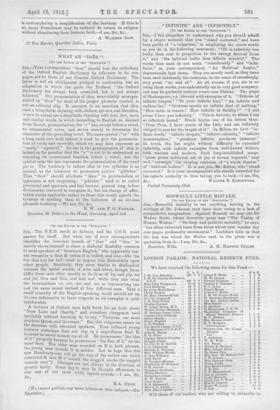FRI THE EDITOR Or TUE nsrserkroa."1
SIR,—The N.E.D. needs no defence, and the C.O.D. must answer for itself. But when one of your correspondents identifies the terminal sounds of " dear" and " idea " he merely shows himself to share a dialectal disability common to most speakers of " Southern English," who apparently can- not recognize a final R unless it is trilled, and who—like the fox that lost his tail—wish to impose this desirability upon other people. Similarly, they seem unable to distinguish between the initial sounds of wine and whine, though these differ from each other exactly as do those of big and pig, vat and fat, then and thin, zeal and seal ; while they also treat the terminations -or, -ore, -oor, and -aw as representing one and the same sound instead of four different ones. That a small minority of the English-speaking world should set up its own deficiencies in these respects as an exemplar is quite indefensible.
A lecturer at Oxford once held forth for an hour about "Poor Lawr and Charity," and countless clergymen used (probably without knowing it) to say, " Victorian, our most gracious Queen and Governor." But this vulgarism seems on the decrease with educated speakers. Your cultured young lecturer nowadays does not slip in a superfluous final R, because be never sounds one at all, He pronounces "the idea of it" properly because he pronounces "the fear of it" on the same lines. The older man sounded an R in both phrases, the young man sounds it in neither. Let us hope that this new Dundrearyism will go the way of the earlier one which converted R into W (" wound the wugge'd wocks the wagged wascals wan"). Changes are not always in the direction of greater laxity. Some day it may be thought effeminate to slur one of our most virile speech-sounds.—I am, Sir, &c., M.A. OxoN.
[We cannot publish any more letters on this subject.—En. Spectator.]






































 Previous page
Previous page